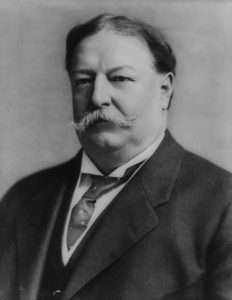The Volokh Conspiracy
Mostly law professors | Sometimes contrarian | Often libertarian | Always independent
Today in Supreme Court History: July 11, 1921
Editor's Note: We invite comments and request that they be civil and on-topic. We do not moderate or assume any responsibility for comments, which are owned by the readers who post them. Comments do not represent the views of Reason.com or Reason Foundation. We reserve the right to delete any comment for any reason at any time. Comments may only be edited within 5 minutes of posting. Report abuses.
Please to post comments



Organized Village of Kake v. Egan, 80 S.Ct. 33 (decided July 11, 1959): Brennan granted restraining order preventing Alaska from enforcing statute criminalizing fish traps against Native American tribe because Secretary of Interior had granted exemption and its livelihood depended on them. (Question on full appeal was whether the Secretary's authority superseded Alaska's. The Alaska Supreme Court ended up ruling against the Native Americans, and the Court affirmed in 1962, 369 U.S. 60, in which Frankfurter, in one of his last majority opinions, derided traps as a "lazy man's device", though he extended Brennan's stay to the end of that fishing season.)
Rockefeller v. Socialist Workers Party, 400 U.S. 1201 (decided July 11, 1970): Harlan granted stay of the District Court's order striking down on Equal Protection grounds requirement that the 12,000 voters needed for petition for statewide ballot include at least 50 voters from each county because it overvalued votes in less populous counties (i.e., giving those counties disproportionate veto power over who gets onto the ballot) (order was affirmed by the Court without opinion on October 12 of that year, 400 U.S. 806, though the District Court's decision shows that the Socialist Party lost on other issues)
just think, Christ Christie's almost as fat as Taft AFTER gastric bypass surgery!
Frankie. It is doctor denial that weight is a choice.
If not already, Christie should be on very high doses of GLP-1 agonists. They will revolutionize weight loss once the vile, slow shuffling, dumbass, lawyer run FDA approves them for such. Bypasses help 65% of people.
The alternative is the 100% effective treatment of Prader Willi Syndrome: 3 shifts of big guys taking food away, and physically enforcing the diet of a nutritionist. They are intellectually disabled, but geniuses at getting food. So it is a challenge.
Sure it's a "choice", "choosing" too many Double Quarter Pounders with Cheese. "Choosing" to eschew any form of exercise, in favor of having a Surgeon Re-route the Intestines Jay-Hey created 5,000 years ago.
It's pure Thermodynamics, if Kcal in > Kcal expended, add an additional pound of lard for every excess 3,500 Kcal.
And seeing as how Taft maxed out at about 330lbs, and Christie at 390, Taft gets a bad rap.
Frank "Slim"
I wonder how Taft's time as POTUS influenced his term as Justice Taft. Did his opinions rely on his previous Executive branch experience to reach a conclusion?
I'm thinking possibly Gitlow. It's hard to say in general.
He issued the opinion in Myers v. United States, which among other things declared the Tenure of Office Act unconstitutional and he was happy to do so. The Act was repealed a few years before but it kept it from being resurrected.
Taft had supported Senator Warren Harding in his successful 1920 presidential bid and was among several individuals who met with Harding to discuss potential nominees to the new administration. According to Taft, Harding casually asked him if he would accept a Supreme Court appointment. Taft replied that he would only accept the position of Chief Justice as he himself had appointed two of the Court's members, and he would not want to be junior to Justice Brandeis, whom he personally opposed. (Chief Justice White, whom Taft has elevated from Associate to Chief, had confided to Taft that he had been holding the seat for him and had been waiting for a Republican president who might appoint Taft.
White would die two months into Harding's presidency, and Harding would nominate Taft to replace him. The nomination was not referred to the Judiciary Committee, but debated before the full Senate in executive session. The roll call vote was 60-4 for confirmation. That vote does not appear in the Senate Journal and has never been made public, but was reported in contemporary newspaper accounts. Three of the "nay" votes came from prominent progressive Republicans, Hiram Johnson of California, William Borah of Idaho, and Robert La Follette of Wisconsin, highlighting the burgeoning conservative/progressive split in the Republican party. (The fourth "nay" vote was cast by Southern Democrat Thomas Watson of Georgia).
Any idea why there were only 64 votes? There were 96 Senators at the time.
I don't know about that particular occasion, but it would not have been unusual for senators to be absent for a variety of reasons, including not feeling anything on that day's agenda was worth their time or trouble. For example, a few years earlier in 1914, President Wilson's first nominee to the Court, James McReynolds, had been confirmed by a vote of 44-6, barely half the Senate voting. Some may have merely abstained from voting on both occasions for whatever reason, but I suspect most were just absent.
Did Taft recuse himself on any cases that concern his own actions as President? Even in the 1920s that must have been fairly common.
Taft recused himself in the case of Biddle v. Perovich, 274 U.S. 480 (1927).
In 1905, Perovich had been convicted of murder in Alaska and sentenced to death. In 1909, President Taft commuted his sentence to life in prison. The issue before the Court was whether the President had the authority to do so without the consent of a defendant. The Court by a vote of 8-0 held that he did, limiting Burdick v. United States, 236 U.S. 79 (1915).
I believe this was the only case in which Taft recused himself.